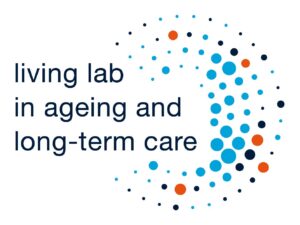Learning communities of staff, family, and residents for improvement of relationship-centered care
In 2017, a new quality framework on how to maintain and improve quality of care in nursing homes was implemented in the Netherlands. In this framework, ‘good quality’ is defined as care that is resident-centered and is provided in a value-creating network of residents, family members and staff. To improve care in these networks, while paying attention to the ever-changing environment and the complexity of care provision, nursing homes need to be learning organizations.
The aim of this initiative is to facilitate and create an open learning and improvement climate in nursing homes to increase experienced quality of care (for residents and family members) and work (for staff). To reach this aim, residents, family members, resident representatives, care staff, CEOs of care organizations, researchers and educators (working at a university, a university of applied sciences or a vocational training institute) of the Living Lab in Ageing & Long-Term Care (https://link.springer.com/article/10.1007/s12603-019-1288-5 ) collaborate.
The learning and improvement climate will be changed through the formation and evaluation of learning communities in nursing homes. Three components (strategic (learning climate), tactical (management role), operational level (learn in collaboration with all stakeholders)) are embedded in these communities. We strive to develop 10 local learning communities (10 different nursing homes) that can learn with and from each other.
These learning communities will provide opportunities to critically reflect on current care provision and will lead to the exchange of knowledge and experiences. The Connecting Conversations method, developed within the Living Lab (Sion et al. 2020), provides insight into (changes of) the experienced quality in nursing homes. It is a narrative method that assesses experienced quality from the resident’s perspective by conducting separate conversations with a resident, family member and professional caregiver of that resident. Key elements of the method are that it approaches experienced quality as a dynamic process influenced by expectations and interactions(INDEXQUAL framework, Sion et al. 2019); it includes the resident-family-caregiver care triad (person-directed and relationship-centred care); it adopts a positive approach (appreciative inquiry), and interviewers are nursing home staff members who perform conversations with an app in each other’s care organizations after having received a training (learning network). Short-cyclical action research is applied within the learning communities to assess how and to what extent improvements in -experienced quality have been made.
The initiative will lead to:
a) Indicators to assess the extent to which and how nursing homes are learning and improving with regard to experienced quality;
b) A method to facilitate learning and improving in nursing homes, in residents-family-staff networks
c) Insight into the feasibility and effectiveness of the learning communities with regard to experienced quality care (residents and family members) and work (staff).
Due to the COVID-19 pandemic, only a few Connecting Conversations could take place in 2020. In forwards, staff and/or family were additionally invited to share experiences in group conversations. Concrete results in these wards were, e.g., that perceived loneliness of residents during the pandemic triggered staff to deliver more individual resident care (individual conversations or one-on-one activities).

